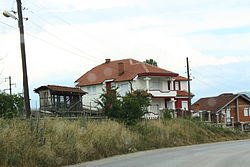You can help expand this article with text translated from the corresponding article in Macedonian. (February 2021) Click [show] for important translation instructions.
|
Velešta (Macedonian: Велешта, Albanian: Veleshtë) is a village in the municipality of Struga, North Macedonia.[1]
Velešta
Велешта Veleshtë | |
|---|---|
Village | |
 Velešta | |
| Coordinates: 41°14′26″N 20°38′38″E / 41.24056°N 20.64389°E | |
| Country | |
| Region | |
| Municipality | |
| Elevation | 691 m (2,267 ft) |
| Population (2021) | |
| • Total | 3,378 |
| Time zone | UTC+1 (CET) |
| • Summer (DST) | UTC+2 (CEST) |
| Area code | +38946 |
| Car plates | SU |
| Website | . |
Geography
editThe village is located in the Drimkol area, in the central part of the territory of the Municipality of Struga, on the left side of the river Black Drin. The village is flat, at an altitude of 716 meters, but there are some houses which are located higher. Part of the village is located on the regional road Struga-Debar, and from the city of Struga itself is 8 km away.[2]
The village is located in the northwestern parts of Struga Field, at the foot of Mount Jablanica.
History
editLocal traditions among Velešta residents hold that the earliest people to settle in the village originated from Debar with the Istrefaj (Istrefllarë) and Vinca (Vojncallarë) families being the first to do so.[3]
In 1900, Vasil Kanchov gathered and compiled statistics on demographics in the area and reported that the village of Veleshta (Велеща) was inhabited by about 1100 Albanian Muslims.[4]
Economy
editThe village covers an area of 9.3 km². It is dominated by arable land on an area of 829.3 hectares, pastures account for 19 hectares, and forests only 1.7 hectares.
The village basically has an agricultural function.
It also has an unfortunate reputation as a sex trafficking hub.[5][6] The authorities have carried out numerous anti-trafficking raids in the village over the past two decades.[7][8]
Demographics
editThe Gheg dialect of the Albanian language is spoken in Velešta.[9]
As of the 2021 census, Velešta had 3,378 residents with the following ethnic composition:[10]
- Albanians 3,254
- Persons for whom data are taken from administrative sources 115
- Macedonians 7
- Others 2
According to the 2002 census, the village had a total of 5834 inhabitants.[11] Ethnic groups in the village include:[11]
- Albanians 5758
- Macedonians 1
- Romani 1
- Others 74
Sports
editLocal football club KF Veleshta plays in the Macedonian Third League (Southwest Division).
References
edit- ^ "Velesta Struga, Macedonia - Velesta Struga | Velesta map". makedonija.name. Retrieved 2016-03-21.
- ^ Панов, Митко (1998). Енциклопедија на селата во Република Македонија (PDF). Скопје: Патрија. стр. 50.
- ^ Tuda, Shpresa (1977). "Të dhëna për zakonet e vdekjes dhe vajtimet në Strugë dhe rrethinë". Gjurmime Albanologjike: Folklor Dhe Etnologji. 5–7: 160. "Pleqtë thonë se veleshtarët e kanë prejardhjen nga Dibra dhe se fiset e para janë: Istrefajt (Istrefllarët), Vinca (Vojncallarët etj. ".
- ^ Vasil Kanchov (1900). Васил Кънчов. „Македония. Етнография и статистика“. София, 1900, стр. 254. (Macedonia: Ethnography and Statistics, p. 254. Accessed 26 May 2019 (in Bulgarian)
- ^ "One night in Velesta". NBC News. 2004-02-03. Archived from the original on December 2, 2020. Retrieved 2024-06-12.
- ^ "Infiltrating Europe's shameful trade in human beings". NBC News. 2004-02-03. Archived from the original on November 12, 2020. Retrieved 2024-06-12.
- ^ "Macedonia: Sex Slave Racket Clampdown". iwpr.net. Retrieved 2024-06-12.
- ^ MadGiven (2013-09-09). "Discovery of 20 Young Women Forced to Work Illegally in Macedonia Highlights Human Trafficking Threat in S. Europe". HUMAN RIGHTS SOCIETY. Retrieved 2024-06-12.
- ^ Tuda, Rahmi (1988). "Rreth disa termave filozofikë në vajtimet e fshatrave Veleshtë dhe Shum të Strugës". Gjurmime Albanologjike: Folklor Dhe Etnologji. 18: 211. "Veleshtë (ku flitet gegërishtja)".
- ^ Total resident population of the Republic of North Macedonia by ethnic affiliation, by settlement, Census 2021
- ^ a b Macedonian Census (2002), Book 5 - Total population according to the Ethnic Affiliation, Mother Tongue and Religion, The State Statistical Office, Skopje, 2002, p. 81.
External links
edit
